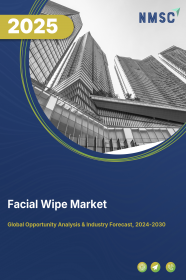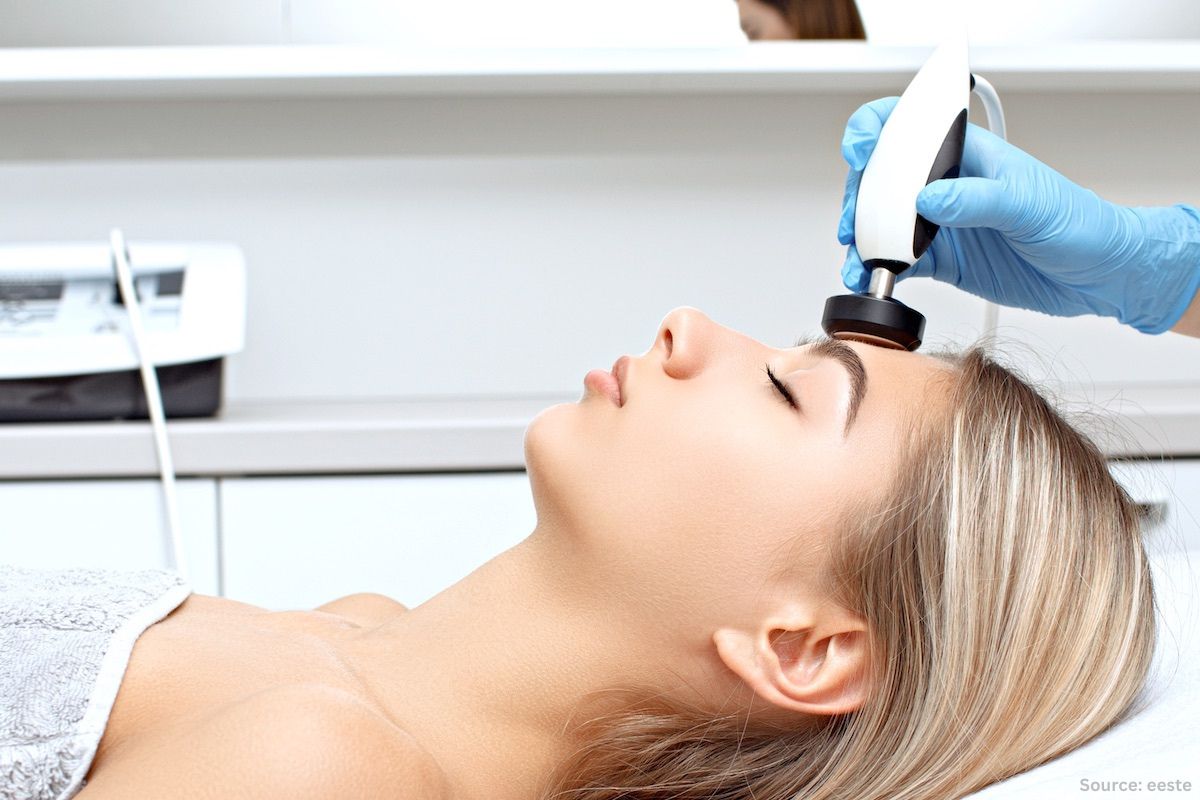
Facial Wipe Market by Face Type (Sensitive skin, Oily skin, Dry skin, and Acne-Prone Wipes), by Product Type (Absorbent Cotton and Non-Woven Fabric), by Usage (Disposable and Non-Disposable), by Category (Conventional facial wipes and Organic facial wipes), by Nature (Wet facial wipes and Dry facial wipes), by Age Group (13-19 Years, 20-29 Years, 30-45 Years, and 45-59 Years), and by Distribution channel - Global Opportunity Analysis and Industry Forecast 2024-2030
Market definition:
The global Facial Wipes Market was estimated at USD 2.92 billion in 2023 and is predicted to reach USD 4.81 billion by 2030 with a CAGR of 7.40% from 2024-2030.
Facial wipes, popularly known as wet tissues are saturated towelettes that provide quick and gentle cleansing of the face by removing excess grime and sebum. These wipes are free from irritation and contain artificial perfumes to give a refreshing feeling to the skin. Facial wipes contain natural ingredients including coconut oil, rose water, copherol, alcohol and some chemicals to avoid skin irritation or rashes. These wipes are extremely easy to use and quicker than the alternatives such as paper towels, cloth, or dispensing liquid. Facial tissues are widely used to remove makeup, oil and dirt with a few easy swipes.
Market dynamics and trends:
The demand for facial wipes is increasing globally due to flexibility of using a wet wipe to clean one’s face whenever required. Also, the facial wipes come in handy packages and contain various aromas that give a refreshing feeling to the user, which is expected to attract consumers, particularly the millennials and GenZ population.
Moreover, the growing popularity of multifunctional products boosts the facial wipes market, as it serves various applications such as cleansing, removing makeup along with removing sweat, dirt and oil when outdoors. In addition, innovation in the formulation of the facial wipes with added natural essential oils such as tea tree oil, coconut oil and lavender essential oil gives extra moisturization to the skin. This influences consumers to prefer the adoption of facial wipes over other cleaning products available in the market.
However, harmful chemicals used in manufacturing of facial wipes such as sodium lauryl sulfate, preservatives, propylene glycol, and others that cause skin and eye irritation are expected to restrain the growth of the market during the forecast period. On the other hand, various research and development strategies are adopted by several manufacturers for the replacement of chemicals from the product formulation with organic and natural ingredients. This factor is expected to create lucrative opportunities for facial wipes manufacturers in the upcoming years.
Market segmentations and scope of the study:
The facial wipes market share is analyzed on the basis of face type, product type, usage, category, nature, age group, distribution channel, and geography. On the basis of face type, the market is segmented into sensitive skin, oily skin, dry skin and acne-prone wipes. On the basis of product type, the market is classified into absorbent cotton and non-woven fabric. Based on usage, the market is categorized into disposable and non-disposable. On the basis of category, the market is bifurcated into conventional facial wipes and organic facial wipes. On the basis of nature, the market is classified into wet facial wipes and dry facial wipes. Based on age group, the market is divided into 13-19 years, 20-29 years, 30-45 years, and 45-59 years. On the basis of distribution channels, the market is segmented into supermarkets, hypermarkets, convenience stores, specialty stores, online retail, and others. Geographic breakdown and deep analysis of each of the aforesaid segments include North America, Europe, Asia Pacific and Rest of the world.
Geographical analysis:
Asia-Pacific region holds the lion share of facial wipes market at present and is expected to continue its dominance during the forecast period. This is attributed to the factors such as busy and stressful lifestyles along with depleting environmental conditions that create more concerns about skin in this region. These factors influence the consumers to increase adoption of facial wipes to prevent skin problems. Also, the presence of countries such as Japan, China and South Korea, which are the largest producers of skin care products, including facial wipes further boosts the market in this region. For instance, according to the Observatory of Economic Complexity, South Korea exported USD 6.45 billion and Japan exported USD 4.99 billion worth skin care products in 2020. Moreover, growing demand for cleansing & makeup removal wipes in South Korea are all contributing to the growth of market in this region.
On the other hand, North America is expected to witness a steady rise in the facial wipes market due to the rising population of millennials and gen Z that seeks products to cleanse, moisturize, and refresh their face without dehydrating the skin. For instance, according to the World Economic Forum, there are around 76 million millennials in North America that account for 21% of the total population in 2021. Also, various manufacturers such as Johnson & Johnson and P & G are taking research and development activities to find new options that do not compromise efficacy for sustainability. For instance, in 2021, Johnson & Johnson announced that it planned transition of all makeup-remover wipes into new plant-based material while simultaneously introducing new, recyclable packaging.
Competitive landscape:
Various market players are operating in the facial wipes market such as Procter & Gamble (P&G),LOreal Paris,Unilever,Kimberly-Clark worldwide, Inc.,IMA Group (acquired taeknoweb converting),Johnson & Johnson Consumer Inc.,Amway,Beiersdorf,Diamond Wipes International,Himalaya Wellness Company. These manufacturers are actively indulging in products & technology innovations to enhance their product and increase their growth as well as geographical reach.
For instance, in June 2022, Teknoweb Converting introduced cutting-edge, plastic-free wet wipes product lines at WOW skin care platform. The wipes are made with natural raw materials and packed in sustainable packaging that meets the demand of the customers for sustainable options. Also, in November 2020, Nice-Pak announced plans to double the manufacturing capacity at its facility in Arkansas with an upgrade to its existing production and the addition of a new line. The expansion intents to double the company’s production of baby wipes, facial wipes and flushable wipes to meet the demands of the consumers.
Key Benefits
-
The facial wipes market report provides the quantitative analysis of the current market and estimations from 2022 to 2030. This analysis assists in identifying the prevailing market opportunities to capitalize on.
-
The study comprises of a detailed analysis of the facial wipes market trends including the current and future trends for depicting the prevalent investment pockets in the market.
-
The information related to key drivers, restraints, and opportunities and their impact on the facial wipes market is provided in the report.
-
The competitive analysis of the market players along with their market share in the facial wipes market is mentioned.
-
The SWOT analysis and Porter’s Five Forces model are elaborated in the study.
-
The value chain analysis in the market study provides a clear picture of the stakeholders’ roles.
Key Market Segments
By Face Type
-
Sensitive Skin
-
Dry Skin
-
Oily Skin
-
Acne-Prone Wipes
By Product Type
-
Absorbent Cotton
-
Non-Woven Fabric
By Usage
-
Disposable
-
Non-Disposable
By Category
-
Conventional Facial Wipes
-
Organic Facial Wipes
By Nature
-
Wet Facial Wipes
-
Dry Facial Wipes
By Age Group
-
13-19 Years
-
20-29 Years
-
30-45 Years
-
45-59 Years
By Distribution Channel
-
Supermarket
-
Hypermarkets
-
Convenience Stores
-
Speciality Stores
-
Online Retail
-
Others
By Geography
-
North America
-
U.S
-
Canada
-
Mexico
-
-
Europe
-
UK
-
Germany
-
France
-
Spain
-
Italy
-
Netherlands
-
Denmark
-
Finland
-
Norway
-
Sweden
-
Russia
-
Rest of Europe
-
-
Asia-Pacific
-
China
-
Japan
-
India
-
Australia
-
South Korea
-
Thailand
-
Singapore
-
Rest of Asia-Pacific
-
-
RoW
-
Latin America
-
Middle East
-
Africa
-
Key Players
-
Procter & Gamble (P&G)
-
LOreal Paris
-
Unilever
-
Kimberly-Clark worldwide, Inc.
-
IMA Group (acquired taeknoweb converting)
-
Johnson & Johnson Consumer Inc.
-
Amway
-
Beiersdorf
-
Diamond Wipes International
-
Himalaya Wellness Company

















 Speak to Our Analyst
Speak to Our Analyst





















